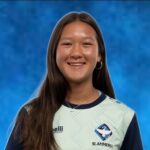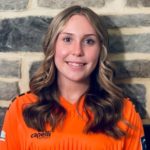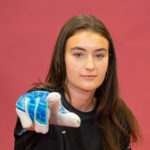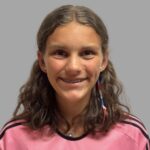Papua New Guinea U-20s take a stand: `We’re here for a purpose´
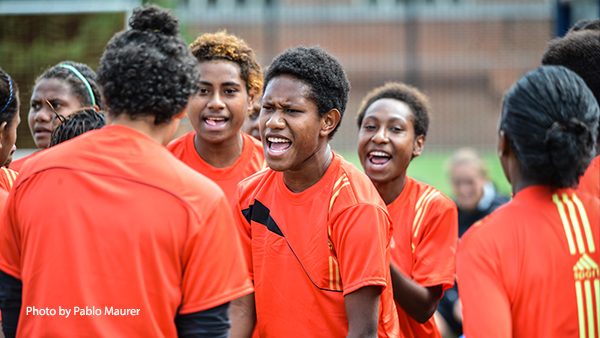
By Charles Boehm and Pablo Maurer
WASHINGTON – Compact and muscular, hair banded and pigtailed, dotted with Nike logos: On first glance the Papua New Guinea U-20s might’ve looked like most any elite girls’ soccer team as they filed into Georgetown University’s Shaw Field for an exhibition match against the home Hoyas on Sunday.
But then a second look quickly turns into a triple-take, and you begin to catch a glimpse of what makes these girls very, very different.
Even before they lined up for one of their songs and dances – full-blooded call-and-response numbers that fuse their dizzyingly diverse cultures and spark smiles on even the most guarded faces – a typical U.S. observer might be confounded by the bird of paradise splashed across their jerseys, or their kinky hair, coffee-brown skin and quiet exchange of a strange, fluid language spotted with only occasional English words.
A little post-game dance for @HoyasWSoc with the U20 team from Papua New Guinea after today’s exhibition. pic.twitter.com/uMDQ0fHri3
— Michael Carey (@MexCarey) September 4, 2016
Georgetown was the final destination of a coast-to-coast U.S. tour for the two dozen teenage players led by former NWSL and longtime college coach Lisa Cole, who must defend their country’s honor against the world’s best when their rough-edged Pacific nation hosts the 2016 FIFA Under-20 Women’s World Cup this fall.
Visiting a range of college programs in search of both match preparation and personal development for young women hailing from some of the most remote communities on earth, the team touched down in Cole’s native Seattle, continued through central Pennsylvania and wound up a life-changing trip with a full immersion into the sights and sounds of the nation’s capital.
Their second-to-last night in the U.S. featured a trip to the Maryland SoccerPlex for an NWSL match between the Washington Spirit and Western New York Flash.
The @SpiritSquadron is stronger tonight thanks to the Papua New Guinea U20 team #WASvWNY pic.twitter.com/iWVzoFtbzu
— Washington Spirit (@WashSpirit) September 3, 2016
“PNG” didn’t win many games on their journey. In fact, every single goal they scored was an occasion for delirious celebration in and of itself. But their perspectives blossomed as they – the representatives of a country called “one of the most dangerous places in the world for women and girls” by Human Rights Watch – experienced life in a women’s soccer hotbed.
“I keep telling the country and the players and people,” said Cole, “that this is a first step in PNG soccer history for the women. This isn’t about getting results. This is about getting experience, seeing a level. You can’t dream about doing something you’ve never seen. Very few people can.
“We’ve talked a lot about being pioneers for the sport, and talked a lot about leaving a legacy.”
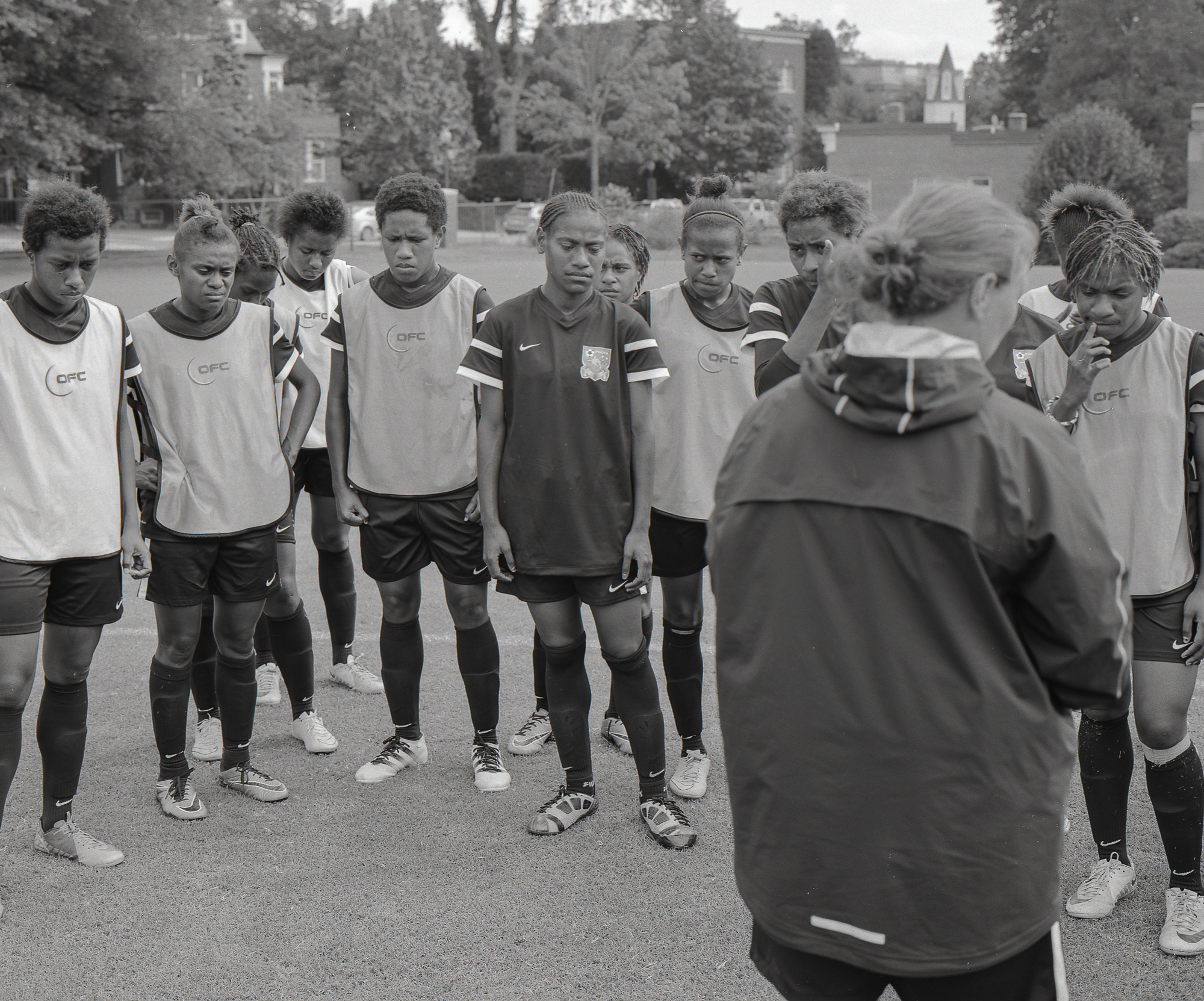 *All images by Pablo Maurer
*All images by Pablo Maurer
The simple fact that any of this is happening at all might just be world soccer’s wildest story of the year.
Papua New Guinea’s hosting of the U-20 Women’s World Cup can be considered both the latest in FIFA’s steady litany of mind-boggling boondoggles AND the greatest opportunity in the short, chaotic and often violent history of a poor, remote nation that marks its 40th birthday next week.
Located just north of Australia in the southwest corner of the Pacific Ocean, “PNG” is one of the last truly wild places on the planet, with population, politics and geography alike deeply fractured by extremely rugged terrain and ancient tribal divisions. Notably, one of the biggest domestic sponsors of Cole’s program is a helicopter company; many PNG communities are accessible only by air or boat and rely on shipments of basic goods, even drinking water. Anthropologists estimate that 44 Papua New Guinea tribes have yet to be contacted by the outside world.
The country’s federation didn’t even field a U-20 women’s program on a full-time basis when FIFA awarded hosting rights in March 2015, and a range of problems subsequently led to a scaling-back of the tournament, which will now be held entirely in four venues in and around the capital city, Port Moresby.
 “The country will be ready for it,” promised Rupa Abraham Mulina, PNG’s ambassador to the U.S., who sat among a small crowd of expatriates from across North America watching Sunday’s match waving PNG flags and signs. “The infrastructure is in place. There’s probably a few things here and there and we’ll be ready for the games.
“The country will be ready for it,” promised Rupa Abraham Mulina, PNG’s ambassador to the U.S., who sat among a small crowd of expatriates from across North America watching Sunday’s match waving PNG flags and signs. “The infrastructure is in place. There’s probably a few things here and there and we’ll be ready for the games.
“This could be a very, very good event for Papua New Guinea – good PR for PNG. The whole world will be watching. Hopefully we’ll win it,” he added with a chuckle.
Other observers don’t quite share his optimism.
A hodgepodge of steep volcanic highlands, coastal towns and countless islands, PNG is home to literally thousands of tribes, many of whom have their own distinct language (more than 800 in all, or some 12 percent of the world’s total) and culture. Though English is taught in school, a pidgin dialect dubbed “Tok Pisin” is the country’s official and unifying tongue. (Cole has learned a few pidgin words but mainly relies on her PNG-based assistant coaches to help her translate from English where needed.)
Tribal and community allegiances trump national or regional identity and archaic attitudes towards women dominate. Sexual violence occurs at sky-high rates – depending on the source, estimates range from 60 to 90 percent of the female population being affected.
The economy is modest, highly dependent on resource extraction. And in the clipped language of the World Bank, “nearly 40 percent of the population lives a self-sustainable natural lifestyle with no access to global capital.” Or in the words of the CIA Fact Book:
“The indigenous population of Papua New Guinea is one of the most heterogeneous in the world; PNG has several thousand separate communities, most with only a few hundred people; divided by language, customs, and tradition, some of these communities have engaged in low-scale tribal conflict with their neighbors for millennia; the advent of modern weapons and modern migrants into urban areas has greatly magnified the impact of this lawlessness.”
It might not sound like a textbook locale for hosting any major international sporting event, much less a women’s youth soccer tournament. But PNG 2016 is happening, and it’s Cole’s job to get the home team playing at their best when they kick off the event on November 13 – against mighty Brazil.
It’s an enormous task. They will in all likelihood get blown out repeatedly, as their stacked group also includes Sweden and North Korea. Much of the team is so young as to also be age-eligible for the next U-20 World Cup two years from now, as PNG looks to build a core of talent capable of qualifying on their own merit out of the Oceania region by then. But the simple opportunity to compete as strong, ambitious young women is a pretty revolutionary thing in their homeland.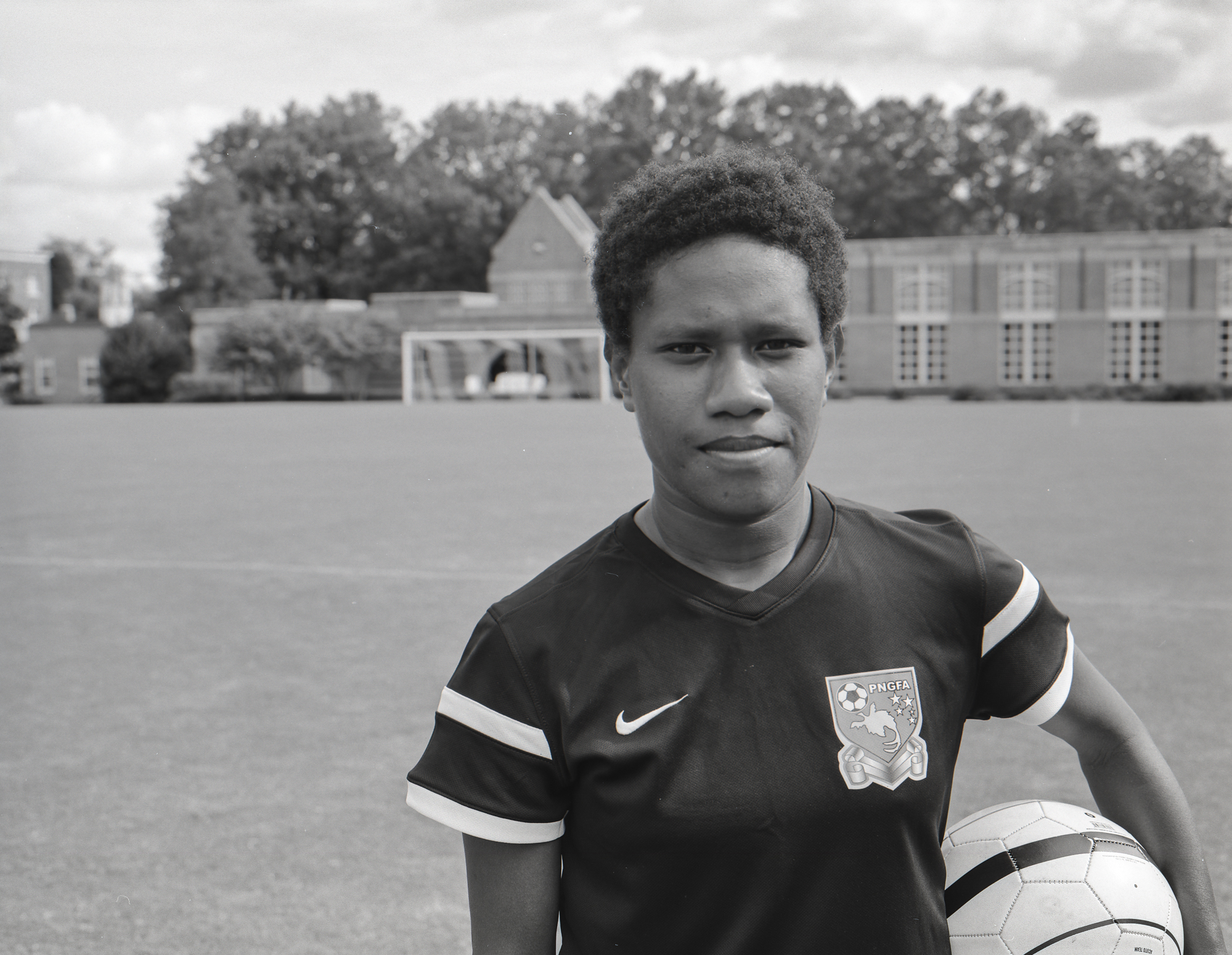
“Back home it’s like men is our first priority,” said team captain Yvonne Gabong (pictured above). “But now women are starting to develop, so women [have started] to know their rights, and women are stepping up. More women are starting to join football and are playing soccer.
“When I grow up, after soccer – if I get a chance to get a scholarship, I can go to school and also play soccer – but in the future I want to be an engineer,” she added. “Maybe after high school I’ll go to university and I can follow my dreams.”
Gabong’s teammate Ramona Padio is quieter and less confident in her English, but expresses herself on the field as one of PNG’s best players, a savvy passer with a heavy shot who would fit in at the NCAA Division II level or thereabouts. Both she and Gabong are already senior internationals for PNG.
“I want to become a lawyer,” Padio said. “After school, any chance to get a scholarship, I’d like to move on to a school and move on and become a lawyer or a coach.”
Padio marveled at the college and youth players they’ve encountered in the U.S.
“We see they are very fast and very athletic, and they are [very good],” she said. “As we’re traveling this far, we see how they play, how fast they are moving the ball and how they work together as a team.”
The concept of teamwork is not an entirely familiar one for PNG – or, for that matter, the concept of PNG itself.
“There isn’t national pride just yet,” said Cole. “There’s a lot of pride in being from Madang, being from Lei, being from Alotau or Bougainville, so they have a sense of real pride of where they’re from, but not of country. So just having them prioritize the badge as being important and wearing the badge is important.
“They don’t understand teamwork. It’s a country where you try to get what you can get as soon as you can get it, because there isn’t plenty of stuff. There’s very little stuff … So just the idea of sharing and doing things together has been really interesting.”
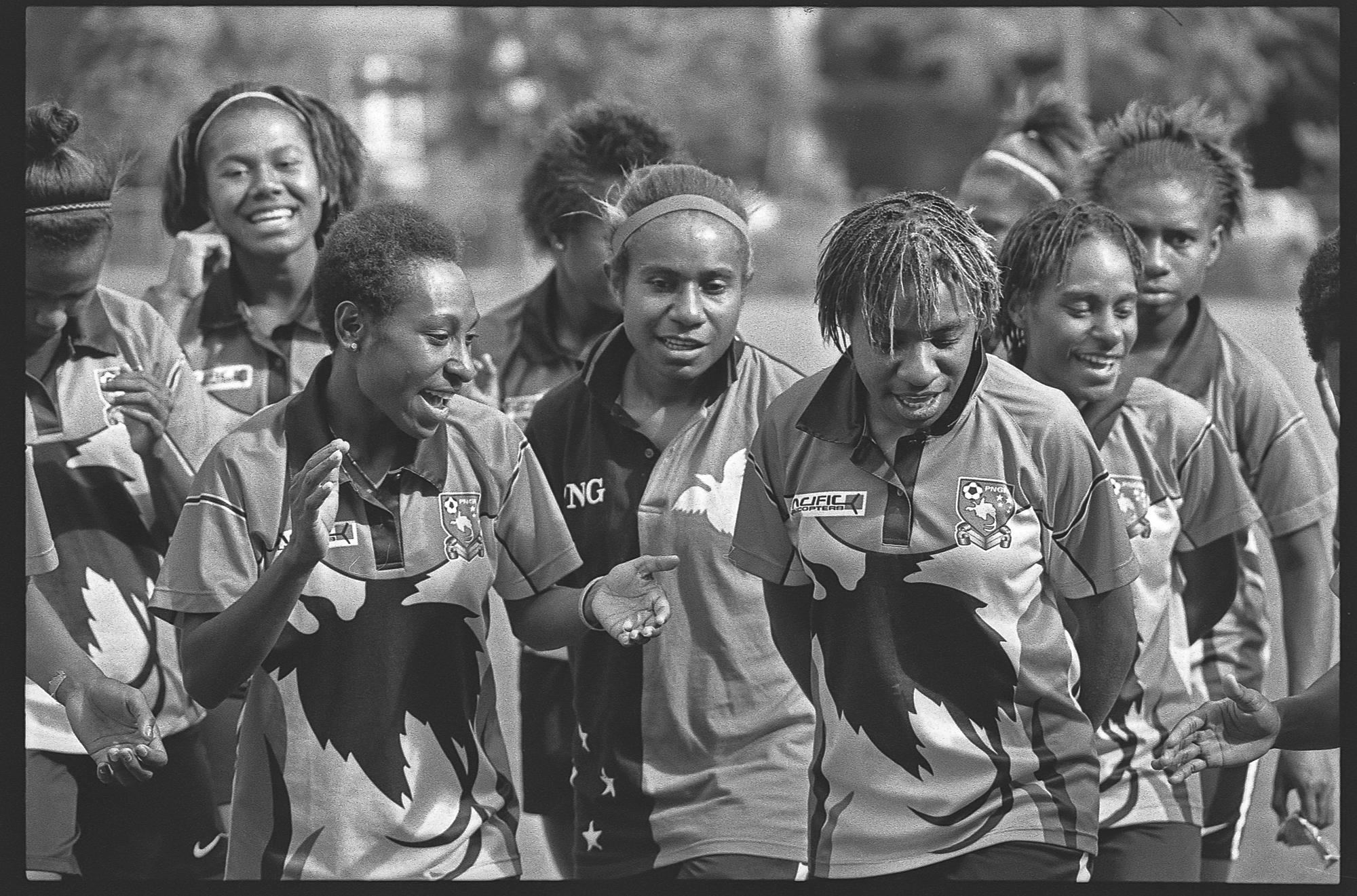 Cole smiles as she explains how a team pregame meal saw the first batch of players to a buffet pile their plates high, leaving nothing for those who arrived last in the rotation.
Cole smiles as she explains how a team pregame meal saw the first batch of players to a buffet pile their plates high, leaving nothing for those who arrived last in the rotation.
“We’ve been doing a lot of cultural dances and they’ve been teaching each other their dances,” she said. “So when the Madang dance is going the Madang kids come to the front and then they lead. But the rest are now following. And then Bougainville, so they’re taking turns, leading their dances and stuff.
“So I feel like we’re going to leave here as a team which, before this trip, I think we were just a collection of players.”
Finale to the clinic w @Lcole22 & the #PNGU20 team yesterday at Fogleman Field. Awesome! pic.twitter.com/4aDOxRSF1z
— CentreSoccer (@centresoccer_pa) August 26, 2016
Cole took the PNG job after visiting the country following conversations with officials from OFC, the Oceania confederation, at the Women’s World Cup in Canada last summer.
Curious and ready for a unique challenge, the former Boston Breakers boss has dived headlong into her work, setting up a Bradenton-style residency program for her players in the mountain village of Goroka, where they train in the mornings and evenings and study or take trades courses during the days and nights.
“It was a bit difficult because our family wasn’t there for us,” said defender Margaret Joseph (pictured below) as she and two of her teammates erupted in teenage giggles. “Just our coach and roommates. So we stayed there for a couple of months and then we started to get used to each other. Basically, now at the moment we don’t usually miss our family because we have a new family here. There’s no reason for us to miss our family back home. We are very happy that we have each other.
“We’re here for a purpose right now. We have a big task to complete ahead, so we are looking forward to that big task. Then after that, we’ll go back and do our education. If it’s up to us to continue our sporting career, than we’ll do that.”
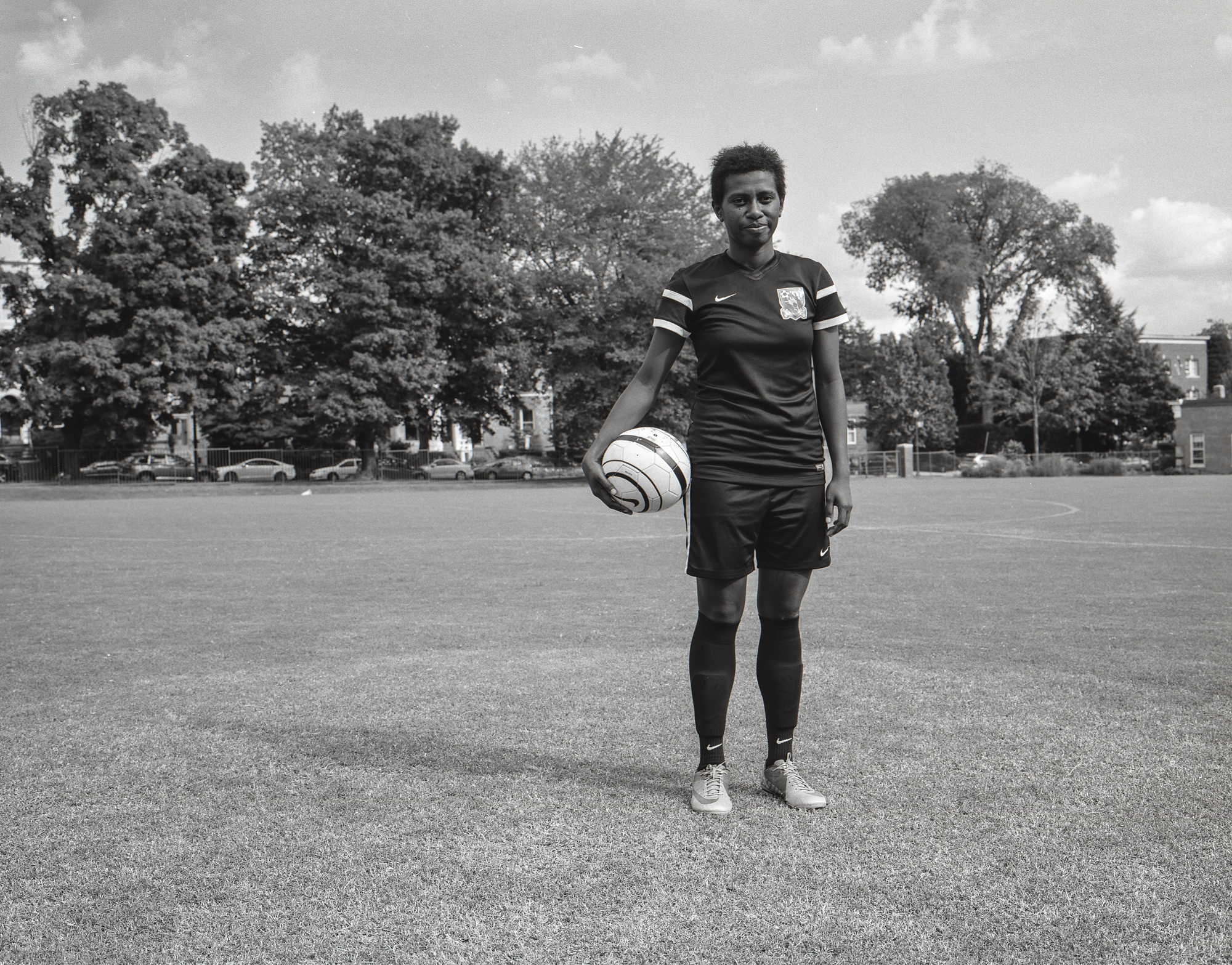 It’s a marked change from the previous norm, where PNG would throw together a team and hustle to prepare a few weeks before major tournaments.
It’s a marked change from the previous norm, where PNG would throw together a team and hustle to prepare a few weeks before major tournaments.
“They didn’t have a U-20 team before this,” Cole explained. “For both the men and the women, everything’s done kind of in a rush to prepare for an event rather than any preparation ahead of time.”
Cole herself still sounds bemused at how she wound up in this adventure. Flying back and forth across the Pacific several times over the past year, she faces myriad cultural differences in addition to the David-and-Goliath scenario that looms in November.
“It was just kind of a weird, weird thing,” she said. “I think they were looking for someone that had high-level experience but had also done a lot of developmental work. I’ve coached all the way from young kids to the pros, so I think I have kind of a diverse outlook. I know what it takes to be at the top, and I also am OK dealing with things that are at the beginning stages.”
She has to wrangle intermittently with federation officials who’ve managed her program’s budget haphazardly – and even recently claimed that her funds have already dried up – while calling on her broad network of friends and contacts across the U.S. for help with this trip.
Nike and Soccer.com donated full training kits, PNG crest and all, while others helped provide boots for the team. In all three U.S. tour stops, Cole’s colleagues and friends have made PNG welcome with free or discounted lodging and field use, and warm gatherings with players from the local community.
“The people here are really friendly,” said Joseph. “We don’t know them that much but for them to come and invite us, being there for us – it’s a really great honor for us … For them to come and stand beside us, to encourage us, it motivates us and gives us encouragement and strength to take on this trip and we’ll take all of their support with us back home.”
A session with Dr. Colleen Hacker, a former coach of Cole’s who has conducted sports psychology training with the U.S. Women’s National Team and myriad other top athletes, helped instill a mantra of “why not us?” in the PNG squad, noting the recent successes of other underdogs like English Premier League champions Leicester City.
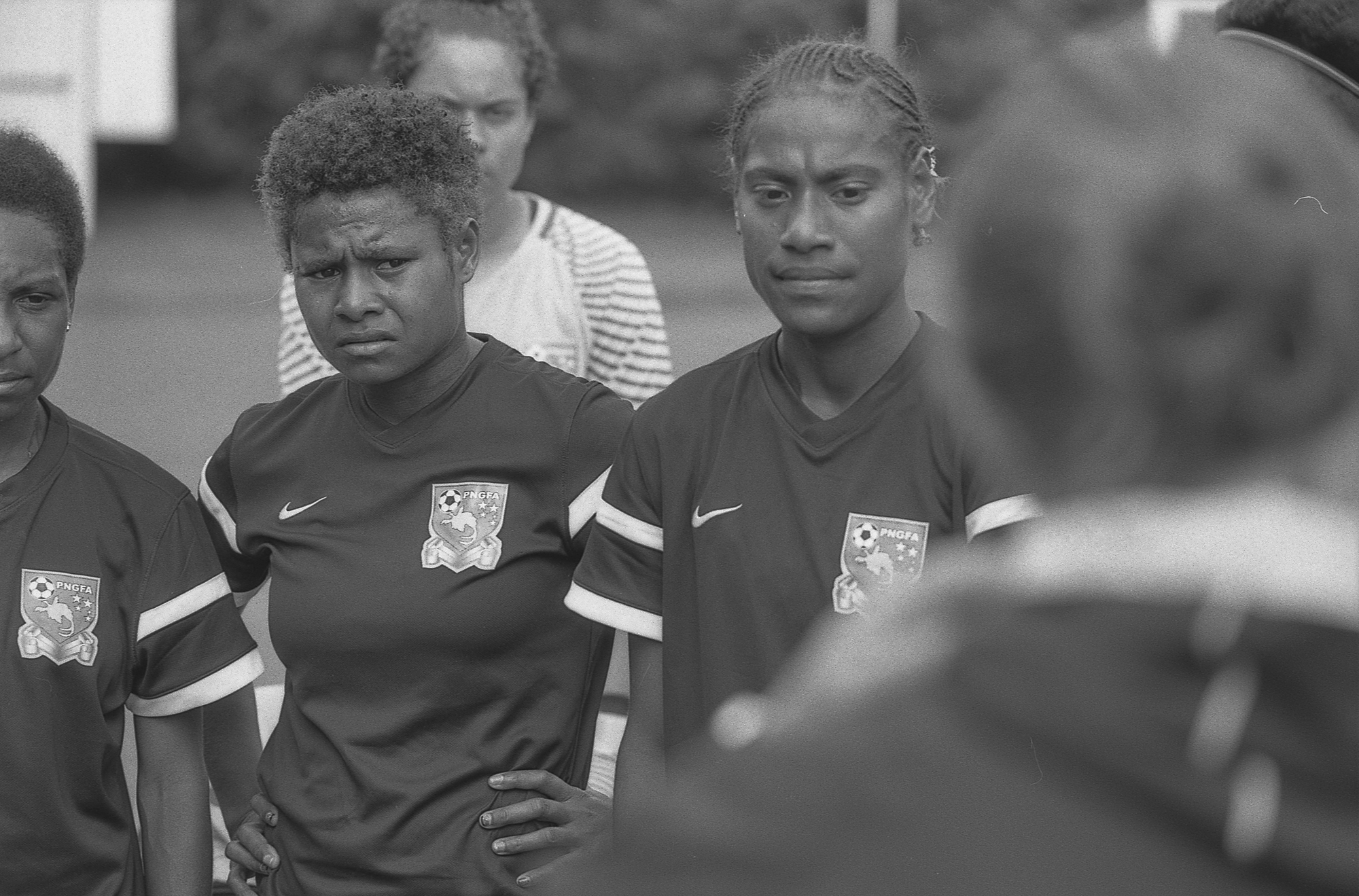 Asked about Cole’s influence, Gabong was effusive.
Asked about Cole’s influence, Gabong was effusive.
“She’s a really good coach,” said the striker. “She’s done a lot for us over the past couple of months. She brought us together and trained us – she left her family back home just to come and stay with us, to make sure the team is running OK. She gave all her heart for us and trained us, and now we’re in her country and we are so excited that she’s with us.”
Joseph chimed in: “She’s a good mom to us. She sometimes really gets on us, but she cares for us.”
Keenly aware of the high prevalence of sexism, rape and domestic abuse in PNG, Cole has taken care to show her players what’s possible for women in the United States. They gasped when the first bus that pulled up to transport them in Seattle had a female driver at the wheel – a dominantly male occupation back in PNG. She later introduced them to an all-women’s fire brigade, where they even got to shoot one of the massive water cannons.
 Youth soccer players today, cultural revolutionaries tomorrow?
Youth soccer players today, cultural revolutionaries tomorrow?
“It’s a great experience,” said Gabong. “Being here, we’ve learned a lot of things both on and off the pitch. Whatever we’ve learned, we’ll try and bring it back to our country and show other people.”
Given their country’s rough treatment of its women, their hopes for social change are daunting – as is the challenge of facing off against World Cup opposition with only about a dozen or so preparation games this year. These players carry the pressure of not only wearing their country’s colors, but doing so as young women, and as hosts in the biggest sporting event in the nation’s history – one where the average home fan will apparently hold hugely unrealistic standards for them.
“They are expecting us to win!” said Joseph with a wry laugh. “We’ll just play our best, do our best and show that Papua New Guineans can play soccer.
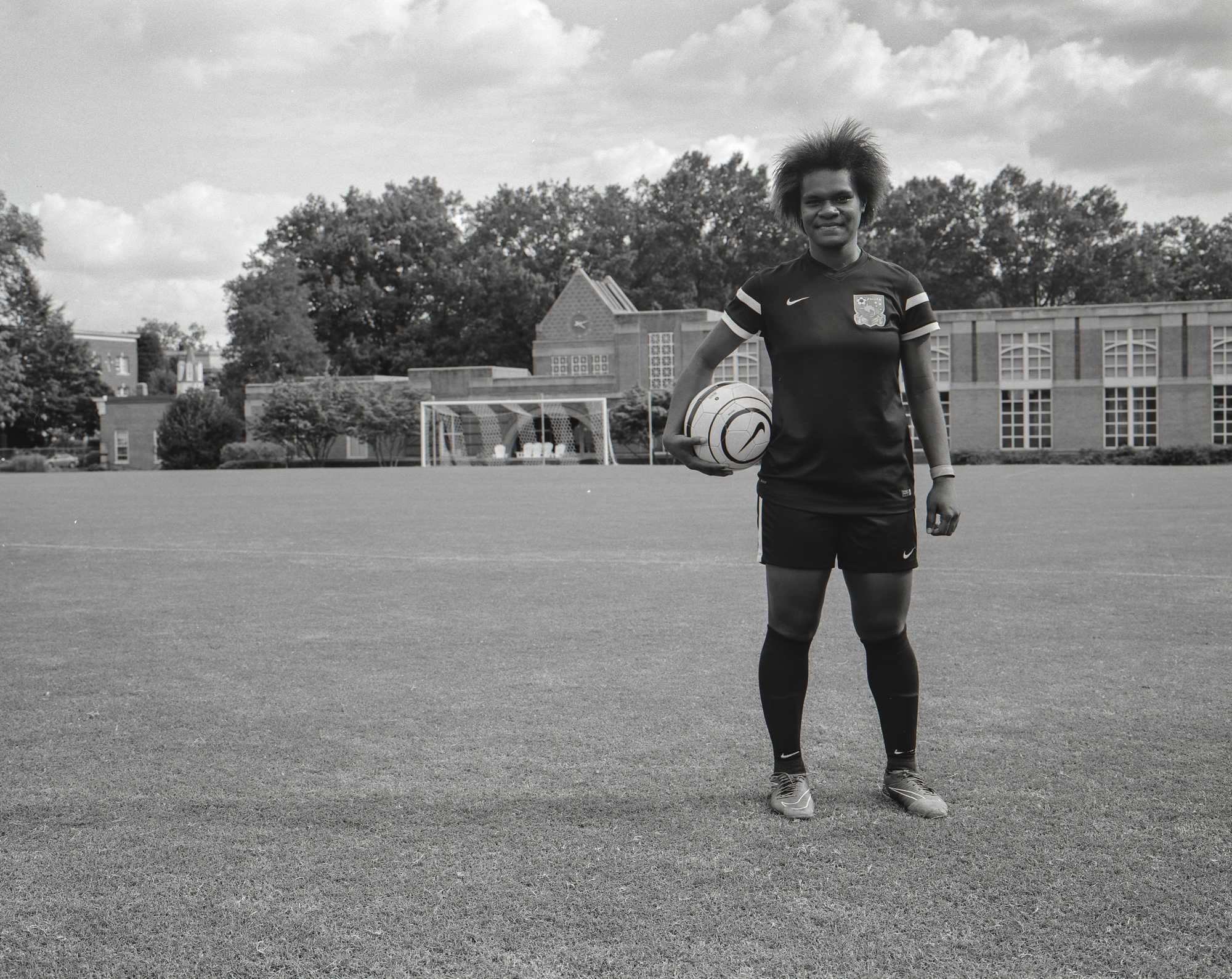 “It’s our first time to host the World Cup and everybody’s excited. Everyone is excited to see women come to PNG and play soccer, and they want to see how fast women can play soccer in other provinces and countries as well. So they are so excited and ready to cheer the other teams also coming into PNG.”
“It’s our first time to host the World Cup and everybody’s excited. Everyone is excited to see women come to PNG and play soccer, and they want to see how fast women can play soccer in other provinces and countries as well. So they are so excited and ready to cheer the other teams also coming into PNG.”
Cole expects to have to bunker for long periods at the World Cup. But she’s also doing her best to inculcate a modern style of play, teaching her squad to play out of the back and strike up quick combinations in the attacking third. Their opponents on this tour have offered up some reality checks, but in a way that has somehow inspired enthusiasm and belief rather than breaking the team’s spirit.
“The colleges haven’t necessarily haven’t put their starting groups out there,” said Cole. “So we’ve been in the games, which has been great, which has been fair. But our quality isn’t good enough and our care in defense – we played the other day and the first 30 minutes, we looked brilliant. Then we gave up two goals in the last 15 minutes.
“Our fitness level, our concentration and attention to detail, that’s been really important to focus on.”
 A reserve-heavy Georgetown lineup won 6-0 on Sunday, for example. But testing themselves against American opposition figures to be a crucial benefit for PNG when the World Cup arrives.
A reserve-heavy Georgetown lineup won 6-0 on Sunday, for example. But testing themselves against American opposition figures to be a crucial benefit for PNG when the World Cup arrives.
“It’s a big deal for PNG. The standards here are much higher,” said Ambassador Mulina. “The experience for them will be great. Because they are under 21, they’ll probably be the next level of senior players for PNG.
“Just watching them, they’ve got a lot more confidence now. They’re building that.”

